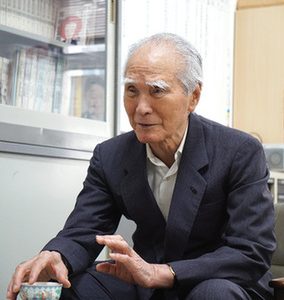Y2021 is the 80th anniversary of the Pacific War, which was caused by the conflict over Manchurian interests between US and Japan. The United States and Japan have allied and are now in a confrontation with China, raising tensions in East Asia. In the above-mentioned article, " the feud against China that binds Japan for a long timeOn the new year," it is pointed out that the origin of the imperial historical view that imprinted the enmity against China and also Korea disdain that led Japan to invade Asia with the Meiji Restoration is in ancient Japan. And without voluntarily liquidating the prewar system of pre-modern ritual unification that set the emperor as a sacred and inviolable god at the top of the Empire of Japan, a true symbiotic-oriented new order could not be built in East Asia. I appealed this. In addition to recognition of this historical recognition, the Japanese government's pledge that "we will work hand in hand with the people of neighboring countries to ensure peace in the Asia-Pacific region and the world" included in the 1995 Prime Minister Murayama consultation are repressing the Japanese government today, which participates in the new Cold War siege of China, together with the United States, the United Kingdom, France, and other former Western powers that once colonized Asia.

The world has seen fifty years elapse since the war came to an end. Now, when I remember the many people both at home and abroad who fell victim to war, my heart is overwhelmed by a flood of emotions.
The peace and prosperity of today were built as Japan overcame great difficulty to arise from a devastated land after defeat in the war. That achievement is something of which we are proud, and let me herein express my heartfelt admiration for the wisdom and untiring effort of each and every one of our citizens. Let me also express once again my profound gratitude for the indispensable support and assistance extended to Japan by the countries of the world, beginning with the United States of America. I am also delighted that we have been able to build the friendly relations which we enjoy today with the neighboring countries of the Asia-Pacific region, the United States and the countries of Europe.
Now that Japan has come to enjoy peace and abundance, we tend to overlook the pricelessness and blessings of peace. Our task is to convey to younger generations the horrors of war, so that we never repeat the errors in our history. I believe that, as we join hands, especially with the peoples of neighboring countries, to ensure true peace in the Asia-Pacific region -indeed, in the entire world- it is necessary, more than anything else, that we foster relations with all countries based on deep understanding and trust. Guided by this conviction, the Government has launched the Peace, Friendship and Exchange Initiative, which consists of two parts promoting: support for historical research into relations in the modern era between Japan and the neighboring countries of Asia and elsewhere; and rapid expansion of exchanges with those countries. Furthermore, I will continue in all sincerity to do my utmost in efforts being made on the issues arisen from the war, in order to further strengthen the relations of trust between Japan and those countries.
Now, upon this historic occasion of the 50th anniversary of the war's end, we should bear in mind that we must look into the past to learn from the lessons of history, and ensure that we do not stray from the path to the peace and prosperity of human society in the future.
During a certain period in the not too distant past, Japan, following a mistaken national policy, advanced along the road to war, only to ensnare the Japanese people in a fateful crisis, and, through its colonial rule and aggression, caused tremendous damage and suffering to the people of many countries, particularly to those of Asian nations. In the hope that no such mistake be made in the future, I regard, in a spirit of humility, these irrefutable facts of history, and express here once again my feelings of deep remorse and state my heartfelt apology. Allow me also to express my feelings of profound mourning for all victims, both at home and abroad, of that history.
Building from our deep remorse on this occasion of the 50th anniversary of the end of the war, Japan must eliminate self-righteous nationalism, promote international coordination as a responsible member of the international community and, thereby, advance the principles of peace and democracy. At the same time, as the only country to have experienced the devastation of atomic bombing, Japan, with a view to the ultimate elimination of nuclear weapons, must actively strive to further global disarmament in areas such as the strengthening of the nuclear non-proliferation regime. It is my conviction that in this way alone can Japan atone for its past and lay to rest the spirits of those who perished.
It is said that one can rely on good faith. And so, at this time of remembrance, I declare to the people of Japan and abroad my intention to make good faith the foundation of our Government policy, and this is my vow.
(Full text of ministry of foreign affairs of Japan)
